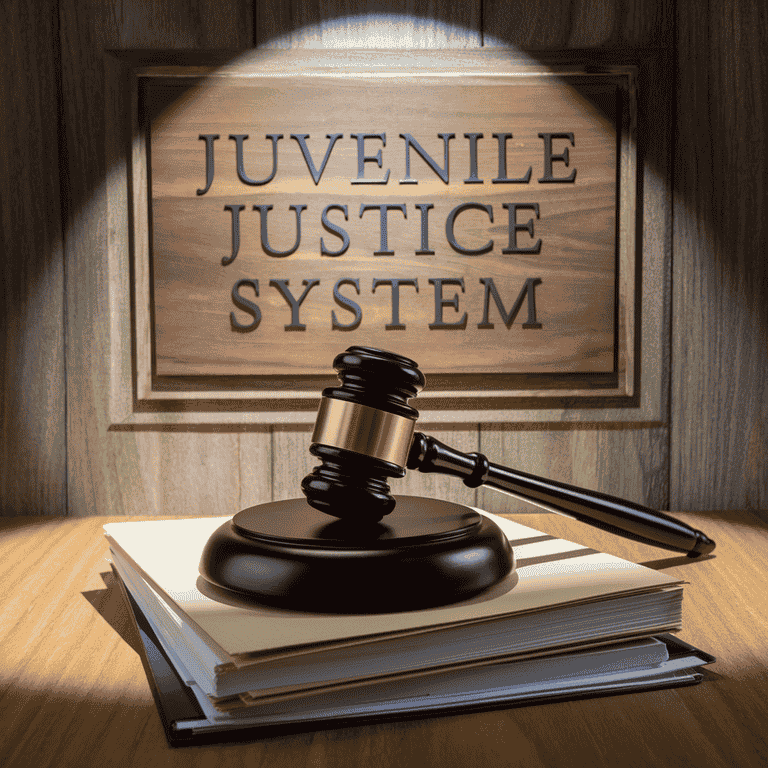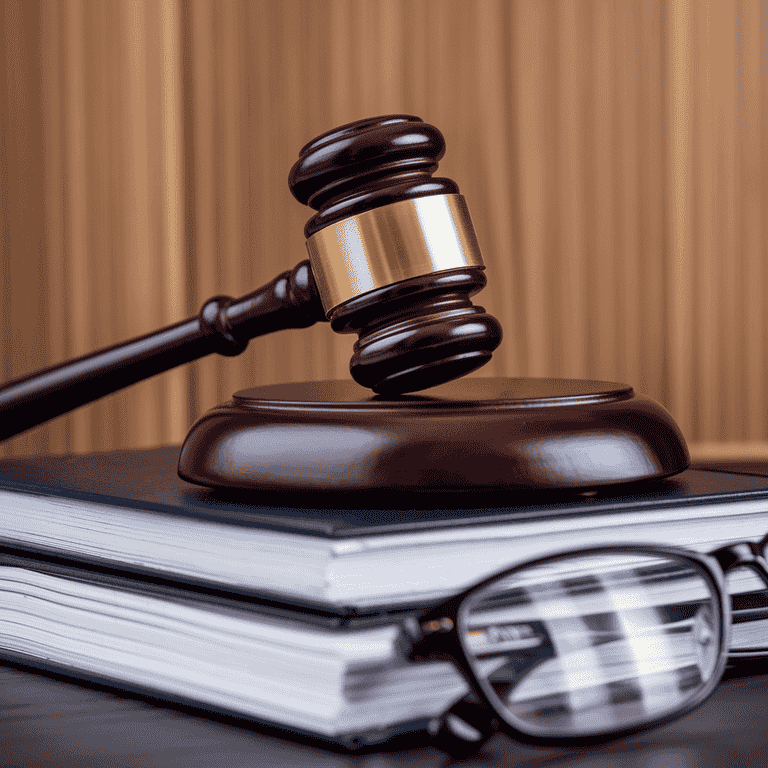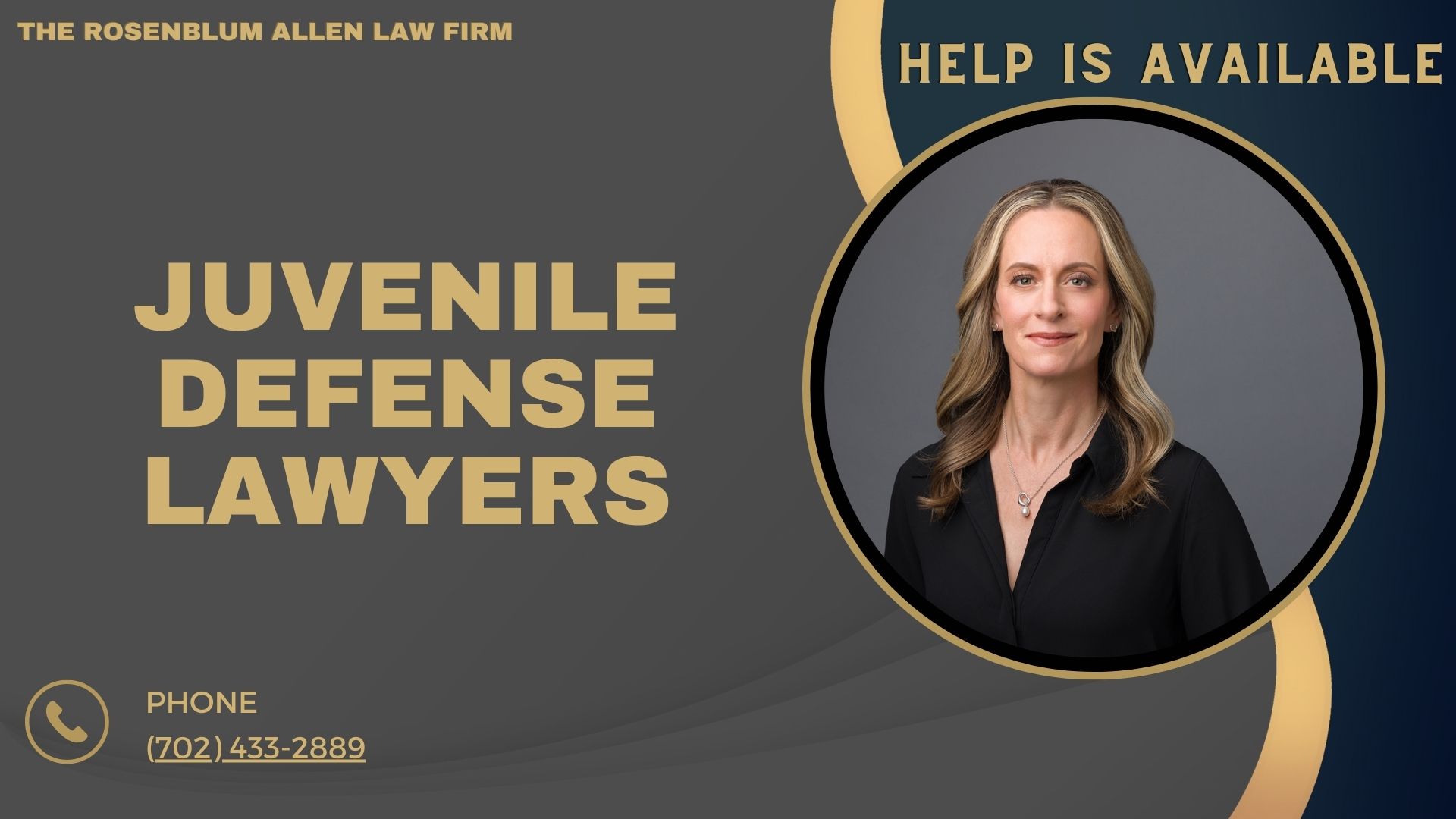Juvenile defense focuses on protecting the rights of minors—anyone under the age of 18—who is involved in legal issues. The goal isn’t just to address the charges and ensure minors are treated relatively under the law.
The legal system for juveniles is different from that for adults. It prioritizes rehabilitation over punishment, recognizing that minors are still developing and can often benefit from second chances.
 Common Types of Juvenile Offenses
Common Types of Juvenile Offenses
Misdemeanors
Misdemeanors are less serious offenses but can still result in legal consequences. Examples include:
- Shoplifting: Taking items from a store without paying.
- Vandalism: Damaging or defacing property, like graffiti.
Felonies
Felonies are more serious and may involve harm to others. Common examples:
- Assault: Physically attacking another person.
- Burglary: Breaking into property to commit a crime.
Status Offenses
Status offenses are only illegal because the offender is a minor. These include:
- Truancy: Skipping school without a valid reason.
- Underage Drinking: Possession or consumption of alcohol.
These offenses may seem minor but can have severe consequences if not handled properly.
The Role of Juvenile Defense Lawyers
Responsibilities of a Juvenile Defense Lawyer
Representation in Court
Juvenile defense lawyers play a critical role when minors face legal trouble. In court, they advocate for the minor’s rights and interests. This includes:
- Presenting evidence that supports the minor’s case.
- Challenging any weak or unfair arguments made by the prosecution.
- Working to minimize penalties and focus on rehabilitation instead of punishment.
A skilled lawyer ensures the judge hears the whole story, not just the charges.
Negotiation with Prosecutors
Not every case has to go to trial. Lawyers often negotiate with prosecutors to resolve cases more favorably. These negotiations can include:
- Plea Deals: Reducing charges or penalties in exchange for admitting guilt.
- Alternative Resolutions: Recommending programs like counseling or community service instead of detention.
This process can make a significant difference in the outcome of the case.
Guidance for Families
Legal issues can be overwhelming for both the minor and their family. A defense lawyer helps by:
- Explaining the legal process step-by-step.
- Discussing potential outcomes so families know what to expect.
- Offering emotional support during a stressful time.
Their role goes beyond the courtroom—they’re an ally for the entire family.
Qualities to Look for in a Juvenile Defense Lawyer
Experience in Juvenile Law
Not all lawyers are familiar with the unique aspects of juvenile cases. Look for someone who:
- Has handled many juvenile cases in your local area.
- Understands the nuances of juvenile courts and laws.
An experienced lawyer can anticipate challenges and navigate them effectively.
Communication Skills
Open and transparent communication is essential. A good juvenile defense lawyer should:
- Explain legal concepts in plain language.
- Keep families updated on developments in the case.
- Be approachable and responsive to questions.
This ensures that everyone involved feels informed and supported.

Legal Processes in Juvenile Defense
Arrest and Detention of Minors
What Happens During an Arrest?
When a minor is arrested, certain legal protections apply:
- Rights During the Arrest: Minors have the right to remain silent and to have an attorney present during questioning.
- Parental Notification: Law enforcement must notify a parent or guardian after the arrest.
The process can feel intimidating, but knowing these rights can help minors and families handle it calmly.
Juvenile Detention Centers
If a minor is held after arrest, they may be sent to a juvenile detention center. These facilities are different from adult jails:
- Purpose: They focus on safety and rehabilitation, not punishment.
- Environment: Juvenile centers are typically less restrictive than adult facilities, and they emphasize education and structured activities.
However, detention can still be stressful, so having a lawyer involved quickly is crucial.
Court Proceedings for Juvenile Cases
Detention Hearings
A detention hearing determines if a minor will be released or kept in custody before trial. Key points include:
- The hearing usually happens within 24-48 hours of the arrest.
- The judge considers factors like the severity of the offense and whether the minor is a flight risk.
Adjudication Hearings
This is similar to a trial in adult court. At this hearing:
- Evidence is presented, and witnesses may testify.
- The judge decides whether the minor committed the alleged offense.
Adjudication hearings are less formal than adult trials but just as critical.
Disposition Hearings
A disposition hearing determines the consequences if the minor is found responsible for the offense. Possible outcomes include:
- Probation: Regular check-ins with an officer and following specific rules.
- Community Service: Performing volunteer work.
- Rehabilitation Programs: Counseling, education, or treatment.
The focus remains on helping the minor move forward productively.
Alternatives to Formal Court Proceedings
Diversion Programs
How Diversion Programs Work
Diversion programs are an alternative to traditional court proceedings. They allow minors to take responsibility for their actions without facing formal charges or a criminal record. Here’s how they work:
- The minor agrees to participate in specific activities like counseling or community service.
- Completion of the program leads to the dismissal of charges.
- The case may return to court if the minor doesn’t finish the program.
These programs focus on education and growth rather than punishment.
Benefits of Diversion
Diversion programs offer several advantages:
- Avoiding a Juvenile Record: Completing a program means no lasting record, which can help with future opportunities.
- Rehabilitation: Programs often include therapy, skill-building, or anger management.
- Cost Savings: Families avoid many of a court trial’s financial and emotional costs.
Diversion is often the best-case scenario for first-time or low-level offenses.
Mediation and Restorative Justice
Resolving Disputes Outside of Court
Mediation and restorative justice provide another alternative to court proceedings. These approaches involve open discussions between the minor, the victim, and trained mediators.
Key components include:
- Acknowledgment of Harm: The minor takes responsibility for their actions.
- Victim’s Voice: The victim explains how the offense affected them.
- Restitution Agreement: Both parties agree on repairing the harm, such as compensation or an apology.
Benefits of Restorative Justice
This approach offers unique advantages:
- Personal Growth: It helps minors understand the impact of their actions.
- Healing for Victims: Victims often feel heard and satisfied with the resolution.
- Reduced Recidivism: Many minors participating in restorative justice are less likely to reoffend.
These alternatives keep minors out of court while fostering accountability and growth.

Why Early Legal Representation Matters
Protecting the Minor’s Future
Impact of a Juvenile Record
A juvenile record can have long-lasting consequences. It might affect:
- Education: Colleges and scholarship programs may see it during application reviews.
- Employment: Some employers conduct background checks, even for minors.
- Housing: Renting an apartment could become more difficult in the future.
Fortunately, many records can be deleted or erased from public view. A lawyer can guide families through this process.
Reducing Potential Penalties
Early legal representation increases the chances of favorable outcomes. Lawyers can:
- Argue for dismissal of charges or reduced penalties.
- Suggest alternatives like diversion or mediation.
- Present evidence that highlights the minor’s positive qualities and potential.
The sooner a lawyer gets involved, the better the chances of avoiding harsh consequences.
Emotional Support for the Minor and Family
Navigating Stressful Situations
Facing legal issues is stressful for any family. A good lawyer provides not just legal help but emotional support by:
- Offering reassurance during an uncertain time.
- Explain the process in clear, simple terms.
- Helping parents and minors feel less overwhelmed.
This guidance helps families focus on moving forward rather than feeling stuck in fear or confusion.

Breaking It All Down
Hiring an experienced juvenile defense lawyer is one of the most important steps you can take when a minor faces legal trouble. The right attorney does more than defend a case—they help protect a young person’s future.
Juvenile defense focuses on giving minors a second chance. Whether negotiating alternative solutions, navigating court processes, or finding ways to delete a record, the lawyer ensures the best possible outcome.

Frequently Asked Questions
Can a juvenile be tried as an adult?
In some instances, a juvenile can be tried as an adult. This usually happens for severe crimes like violent felonies or repeat offenses. The decision depends on factors such as the minor’s age, the nature of the crime, and their prior record.
What happens if a juvenile violates probation?
If a minor violates probation, the court may impose additional consequences. These could include stricter probation terms, mandatory counseling, community service, or placement in a juvenile detention facility.
Are parents held responsible for their child's offenses?
In some situations, parents may face legal or financial consequences for their child’s actions. For instance, they may be required to pay restitution for damages caused by the minor’s offense.
How long does a juvenile case typically last?
The length of a juvenile case varies based on its complexity. Simple cases resolved through diversion programs may take only a few weeks, while court proceedings can last several months.
Do juveniles have the right to a trial by jury?
Juvenile courts typically do not use juries. Instead, a judge hears the case and determines the outcome. This process is designed to be less adversarial and more focused on the minor’s rehabilitation.
Can a juvenile defense lawyer attend school meetings or hearings?
Some juvenile defense lawyers may assist with school-related issues, such as disciplinary hearings, especially if the case involves truancy or behavior tied to the charges.
Is a juvenile's record automatically sealed at 18?
Only sometimes. While many juvenile records are eligible for sealing or expungement, the process is only automatic in some states. Families often need to file a request, and certain offenses may not qualify.
What should parents do if their child is arrested?
Parents should stay calm, ensure their child understands their rights, and immediately contact a juvenile defense lawyer. It’s also important to avoid discussing the case with authorities until legal representation is present.
Can minors refuse to answer police questions?
Yes, minors have the right to remain silent. They should politely request a lawyer and a parent or guardian present before answering any questions.
How does social media impact a juvenile case?
Social media activity can influence a juvenile case. Posts, comments, or photos of the incident could be used as evidence. It’s wise for minors and their families to avoid discussing the case online.
Are juvenile court proceedings private?
Yes, most juvenile court proceedings are private to protect the minor’s confidentiality. However, in some cases, especially for serious crimes, proceedings may be open to the public.
What if a minor is accused of a crime they didn't commit?
If a minor is wrongfully accused, a juvenile defense lawyer can investigate the case, gather evidence, and advocate for the charges to be dropped or the minor to be acquitted.
Can a juvenile case be appealed?
Yes, a juvenile case can be appealed if there are legal errors or new evidence emerges. An experienced lawyer can guide families through this process.
Do juvenile defense lawyers handle cases involving school disciplinary actions?
Some juvenile defense lawyers may also represent minors in school-related disciplinary cases, especially when connected to legal charges.
What is the role of a probation officer in a juvenile case?
Probation officers monitor the minor’s compliance with court-ordered conditions. They update the court and may recommend changes to probation terms based on the minor’s behavior.

Further Reading
Molly Rosenblum, Esq., our distinguished lead attorney, has also meticulously crafted a comprehensive range of resources aimed at assisting individuals navigating the complexities of criminal law. These invaluable resources, available on the Rosenblum Law website, provide detailed insights and guidance on various criminal law matters. Whether you’re seeking representation or simply looking to understand the intricacies of the criminal justice system, these resources are designed to offer support and clarity:
Criminal Defense Attorneys: Effective legal representation and advice for those facing criminal charges, ensuring your rights are protected throughout the legal process. Explore the resource.
Las Vegas DUI Lawyer: Specialized guidance and defense strategies for those dealing with DUI charges in Las Vegas. Learn more.
Domestic Violence Lawyer Las Vegas: Dedicated support and legal representation for individuals facing domestic violence charges, offering a compassionate and robust defense. Find assistance.
Drug Possession Lawyer: Effective legal advice and representation for drug possession charges, aiming to navigate and mitigate the consequences of such charges. Seek representation.
Sex Crimes Attorney: Specialized legal support for those accused of sex crimes, providing discreet and determined defense services. Understand your options.
- Misdemeanor Lawyer: Legal assistance for misdemeanor charges, offering guidance and representation to minimize the impact on your life. Learn more.
Las Vegas Warrant Defense Attorney: Assistance with navigating and resolving outstanding warrants, aiming to clear your name and handle legal complications. Address warrant issues.
Las Vegas Probation Violation Attorney: Effective legal advice and representation for probation violation matters, helping to argue your case and protect your freedom. Get help with probation issues.
Theft Crime Defense Lawyer: Robust defense services for those facing theft charges, aiming to protect your rights and minimize the legal repercussions. Protect yourself against theft charges.
Kidnapping Lawyers: Effective legal representation for kidnapping charges, providing a strong defense and striving for the best possible outcome. Seek legal guidance.
Firearms Lawyer Las Vegas: Specialized legal advice and representation for firearms-related charges, ensuring your rights are upheld throughout the legal process. Learn about firearms defense.
Molly Rosenblum, Esq. is committed to offering comprehensive support through these meticulously prepared resources, aiming to guide and assist you during challenging times. We encourage you to utilize these resources and seek professional advice to navigate the complexities of the criminal justice system effectively.

Offsite Resources
American Bar Association (ABA)
The ABA offers a wealth of information on legal topics, including juvenile justice. Their resources are valuable for understanding legal rights and finding additional support.
National Juvenile Defender Center (NJDC)
The NJDC advocates for fair and equitable treatment of youth in the justice system. They provide resources on juvenile law and defense strategies.
Youth.gov
Youth.gov provides a comprehensive overview of programs and strategies to support at-risk youth, including those involved in the juvenile justice system.
Juvenile Law Center
This organization focuses on improving laws and policies affecting youth in the justice system. Their website offers research, reports, and advocacy tools.
Child Mind Institute
The Child Mind Institute provides resources on child behavior, mental health, and how these intersect with the juvenile justice system.
National Center for Mental Health and Juvenile Justice (NCMHJJ)
The NCMHJJ focuses on improving responses to youth with mental health needs who are involved in the justice system.

What's Next?

Thank you for taking the time to explore these resources. I hope they provided helpful information during what may be a challenging time for you and your family. If you’re ready to take the next step, my team and I are here to help you navigate your legal situation with care and expertise.
Please don’t hesitate to call us at (702) 433-2889 to get started. We’re ready to listen, answer your questions, and help you move forward.
Warm regards,
Molly Rosenblum Allen, Esq
The Rosenblum Allen Law Firm




